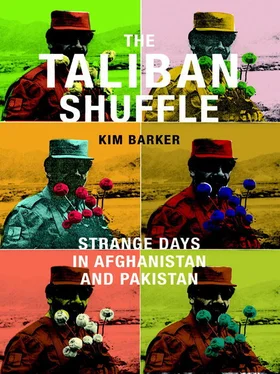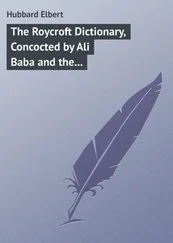Kim Barker
THE TALIBAN SHUFFLE
Strange Days in Afghanistan and Pakistan
To the people of Afghanistan and Pakistan, who are still waiting for the punch line
CHAPTER 1
WELCOME TO THE TERRORDOME
Ihad always wanted to meet a warlord. So we parked our van on the side of the beige road and walked up to the beige house, past dozens of skinny young soldiers brandishing Kalashnikov assault rifles and wearing mismatched khaki outfits and rope belts hiked high on their waists. Several flaunted kohl eyeliner and tucked yellow flowers behind their ears. Others decorated their rifle butts with stickers of flowers and Indian movie starlets. Male ethnic Pashtuns loved flowers and black eyeliner and anything fluorescent or sparkly, maybe to make up for the beige terrain that stretched forever in Afghanistan, maybe to look pretty.
Outside the front door, my translator Farouq and I took off our shoes before walking inside and sitting cross-legged on the red cushions that lined the walls. The decorations spanned that narrow range between unicorn-loving prepubescent girl and utilitarian disco. Bright, glittery plastic flowers poked out of holes in the white walls. The curtains were riots of color.
We waited. I was slightly nervous about our reception. Once, warlord Pacha Khan Zadran had been a U.S. ally, one of the many Afghan warlords the Americans used to help drive out the Taliban regime for sheltering Osama bin Laden and his minions after the attacks of September 11, 2001. But like a spoiled child, Pacha Khan had rebelled against his benefactors, apparently because no one was paying enough attention to him. First he turned against the fledgling Afghan government, then against his American allies. In an epic battle over a mountain pass, the Americans had just killed the warlord’s son. The Pashtun code required revenge, among other things, and now, six days after the battle, here I was, a fairly convenient American, waiting like a present on a pillow in Pacha Khan’s house, hoping to find a story edgy enough to make it into my newspaper—not easy considering it was March 2003, and there were other things going on in the world. But Farouq told me not to worry. He had a plan.
Pacha Khan soon marched into the room. He certainly looked the warlord part, wearing a tan salwar kameez, the region’s ubiquitous traditional long shirt and baggy pants that resembled pajamas, along with a brown vest, a bandolier of bullets, and a gray-and-black turban. The wrinkles on his face appeared to have been carved out with an ice pick. He resembled a chubby Saddam Hussein. We hopped up to greet him. He motioned us to sit down, welcomed us, and then offered us lunch, an orange oil slick of potatoes and meat that was mostly gristle. I had no choice, given how strictly Afghans and especially Pashtuns viewed hospitality. I dug in, using my hands and a piece of bread as utensils.
But just because Pacha Khan fed us, didn’t mean he would agree to an interview. The Pashtun code required him to show us hospitality. It didn’t force him to talk to me. Pacha Khan squinted at my getup—a long brown Afghan dress over black pants, an Indian paisley headscarf, and cat-eye glasses. I kept shifting my position—with a bad left knee, a bad right ankle, and a bad back, sitting on the floor was about as comfortable as therapy.
Farouq tried to sell my case in the Pashto language. The warlord had certain questions.
“Where is she from?” Pacha Khan asked, suspiciously.
“Turkey,” Farouq responded.
“Is she Muslim?”
“Yes.”
“Have her pray for me.”
I smiled dumbly, oblivious to the conversation and Farouq’s lies.
“She can’t,” Farouq said, slightly revising his story. “She is a Turkish American. She only knows the prayers in English, not Arabic.”
“Hmmm,” Pacha Khan grunted, glaring at me. “She is a very bad Muslim.”
“She is a very bad Muslim,” Farouq agreed.
I continued to grin wildly, attempting to charm Pacha Khan.
“Is she scared of me?” he asked.
“What’s going on? What’s he saying?” I interrupted.
“He wants to know if you’re scared of him,” Farouq said.
“Oh no,” I said. “He seems like a perfectly nice guy. Totally harmless. Very kind.”
Farouq nodded and turned to Pacha Khan.
“Of course she is scared of you,” Farouq translated. “You are a big and terrifying man. But I told her you were a friend of the Chicago Tribune , and I guaranteed her safety.”
That satisfied him. Unaware of Farouq’s finesse, I proceeded with my questions about Pacha Khan’s deteriorating relationship with the Americans. Then I asked if I could have my photograph taken with the warlord, who agreed.
“Make sure you get the flowers,” I told Farouq.
In one picture, Pacha Khan peered sideways at me, with an expression suggesting he thought I was the strange one. I snapped Farouq’s picture with Pacha Khan as well. Souvenirs in hand, we left. But we still had two more hours of bumpy, unforgiving road south to the town of Khost, an experience similar to being flogged with baseball bats. Farouq taught me the numbers in the Dari language and told me about the real conversation he had with Pacha Khan.
“I don’t think it’s ethical to say I’m Turkish,” I said.
“I don’t think it’s safe to say you’re American. The Americans just killed his son. Trust me. I know Afghans. I know what I’m doing.”
I shut my mouth, but I still didn’t see what the big deal was. I had glasses. I was obviously harmless. And Pacha Khan seemed more bluster than bullet.
As we wandered around Pacha Khan-istan, calling me naïve was almost a compliment; ignorant was more accurate. This was only my second trip to Afghanistan as a fill-in correspondent for the Tribune , and I was only supposed to babysit a war that nobody cared about while everyone else invaded Iraq. With my assumed swagger and misplaced confidence, I was convinced that I could do anything. Meeting a warlord whose son had just been killed by the Americans was nothing but a funny photo opportunity. I felt I was somehow missing out by not being in Iraq, the hitter sidelined for the championship game. Like everyone else, I figured Afghanistan was more of a sideshow than the big show.
Back then, I had no idea what would actually happen. That Pakistan and Afghanistan would ultimately become more all consuming than any relationship I had ever had. That they would slowly fall apart, and that even as they crumbled, chunk by chunk, they would feel more like home than anywhere else. I had no idea that I would find self-awareness in a combat zone, a kind of peace in chaos. My life here wouldn’t be about a man or God or some cause. I would fall in love, deeply, but with a story, with a way of life. When everything else was stripped away, my life would be about an addiction, not to drugs, but to a place. I would never feel as alive as when I was here.
Читать дальше















